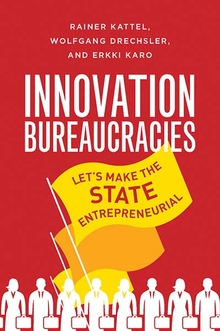How to Make an Entrepreneurial State
WARNING
You are viewing an older version of the Yalebooks website. Please visit out new website with more updated information and a better user experience: https://www.yalebooks.com
Why Innovation Needs Bureaucracy
Rainer Kattel, Wolfgang Drechsler, and Erkki Karo
A ground-breaking account which shows how the public sector must adapt, but also persevere, in order to advance technology and innovation
From self-driving cars to smart grids, governments are experimenting with new technologies to significantly change the way we live. Innovation has become vitally important to states across the world.
Rainer Kattel, Wolfgang Drechsler and Erkki Karo explore how public bodies pursue innovation, looking at how new policies are designed and implemented. Spanning Europe, the USA and Asia, the authors show how different institutions finance new technologies and share cutting-edge information. They argue for the importance of ‘agile stability’, demonstrating that in order to successfully innovate, state organizations have to move nimbly like start-ups and yet ensure stability at the same time. And that, particularly in the light of the Covid-19 pandemic, governments need both long-term policy and dynamic capabilities to handle crises.
This vital account explores the complex and often contradictory positions of innovating public bodies—and shows how they can overcome financial and political resistance to change for the good of us all.
Rainer Kattel is professor and deputy director at the UCL Institute for Innovation and Public Purpose. Wolfgang Drechsler is honorary professor at the UCL Institute for Innovation and Public Purpose and professor of governance at the Nurkse Department of Innovation and Governance at TalTech, as well as associate at Harvard University’s Davis Center. Erkki Karo is associate professor and head of department at the Nurkse Department of Innovation and Governance at TalTech.
Publication Date: September 13, 2022








